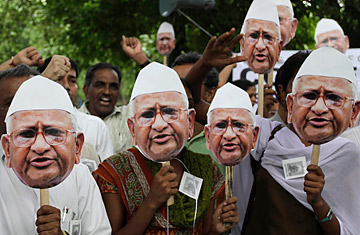
Solidarity
Indians hold cutouts of Hazare during a protest in support of his fight against corruption in Ahmadabad, August 17, 2011.
(2 of 2)
Gopal, a yoga teacher from Hrishikesh, came to Delhi to join the protest, complaining that he had to pay a bribe to get his passport. Hari Singh, a small trader from Lucknow, took a few days off from work to register his anger at having to pay a bribe to a government clerk to ensure that his wife, a teacher in a government school, gets paid every month. "I don't care about college, this much I can sacrifice for the man who is doing so much for the country," says Pradip Ghosh, an engineering student from Kolkata. "I started a fast at home but my mother put a stop to it. So, I decided to come here and fast along with him."
Although they had little knowledge of the details of Hazare's Jan Lokpal bill, they are confident that if it is passed, corruption will be rooted out. That unquestioning faith in the Lokpal has stirred up a lot of skepticism among academics and experts on Indian government. Says Avani Kapur, senior researcher with a New Delhi-based think tank, the Center for Policy Research, "One anti-corruption bill cannot eradicate corruption overnight."
They have been joined by other social activists who have criticized Hazare's undemocratic arm-twisting of Parliament. Tushar Gandhi, Mohandas Gandhi's grandson, rejected comparisons of Hazare's fast to that of the Mahatma. Instead of trying to "reform an adversary into a friend," Gandhi told the Times of India, "Anna's fast is against an enemy. It is like a me versus you kind of thing." Activist and author Arundhati Roy wrote in The Hindu newspaper that Hazare's Jan Lokpal is "a draconian, anti-corruption law" that would just add another unaccountable bureaucracy to the existing one — "two oligarchies instead of one."
The cynicism of Delhi's chattering classes has been fueled by frenzied coverage of Hazare's hunger strike by India's populist television news channels. While Hazare's supporters waited in queues stretching for 300 meters to gain entry to the protest ground, there is a special door at the rear of the venue reserved for the media. Inside the grounds, almost every inch is taken up by makeshift platforms for India's major television channels. Small crowds gather around these platforms, with people falling over each other to shout slogans into the camera and obligingly doing retakes on demand. The cameras zoom in on the small groups, giving the impression of a larger, more passionate crowd. Spotting a notebook, people eagerly approached a TIME reporter and offered interviews, although they were visibly disappointed on learning they would not be on television. A girl of about 13, accompanied by her father was overheard asking a television crew, "Can I please give a (sound)byte?"
Appropriately, the protest fast is being held at Delhi's Ramlila Maidan, site of an annual re-enactment of the story of the god Ram, hero of the Hindu epic the Ramayana and considered a model of leadership. An auto rickshaw driver, Kripa Shahu, who was exasperated at the roadblocks around the Ramlila ground, says, "After all this tamasha (drama) has ended, Hazare will walk away with his own glory, everyone will walk away with something, will we the common man walk away with anything?" So far, only one constituency has gotten exactly what they wanted; ratings for television news channels are way up.
